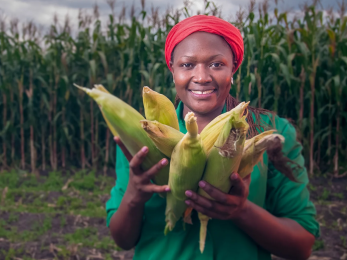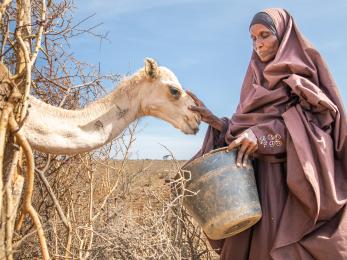Why we (and a cohort of entrepreneurs) invested: Vega Coffee
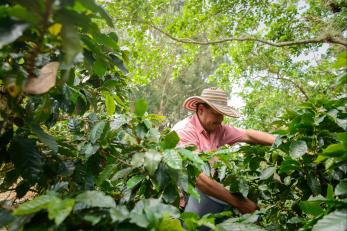
Entrepreneurs and investors don’t always see eye to eye. They often assess businesses and prioritise actions differently. But, in the past year a social venture in the coffee sector was selected for investment both by an institutional investor and a cohort of peer entrepreneurs. This is the story of coffee and how Vega Coffee stood out as investment ready.
Why invest in coffee
From a consumer’s perspective, coffee is better than ever. You can always access a rotating range of single-origin coffees. More often than not, that coffee comes with a strong sense of connection to where it came from, with stories about producers, experimental processing or sustainability. We see smiling farmers and hear of groundbreaking records for microlots.
But this isn’t the true story of coffee.
My lungs burn as I follow Luis Eduardo up a steep hill in Tolima. It’s clear he takes great pride in his coffee farm — he and his family have poured their blood and sweat into it. Through decades of conflict, dramatic coffee price fluctuations, and cycles of inclement weather and disease, they’ve persevered and are now consistently harvesting high-quality beans that they sell to a local co-op. However, Luis Eduardo explains, their income has more or less been stagnant for years. He doesn’t see much a future for coffee farming in the family.
Luis Eduardo’s story isn’t uncommon. The global coffee industry has always been characterised by stark economic contrasts. The middlemen who occupy various roles between consumers and farmers typically do very well financially. However, the farmers who grow in Africa, Latin America and Asia are almost always poor. Worldwide, Root Capital estimates that 20 million coffee farmers live at or below the poverty line, and approximately 95% of coffee farmers make less than $4 (about £3) per day. Coffee is one of the world’s most-traded commodities and its impact extends beyond the smallholder farmers themselves:
“The importance of coffee to the world economy cannot be overstated … Its cultivation, processing, trading, transportation and marketing provide employment for hundreds of millions of people worldwide. Coffee is crucial to the economies and politics of many developing countries …”
Coffee farmers depend on their annual coffee crops for their livelihoods. However, they face a complex mix of major challenges: price volatility, a large flat commodity-grade coffee price (in real terms over the past decades), extreme weather events, labour shortages during harvest season, and consistent (if not, rising) costs of production. As I type this, the New York C price for coffee dropped below $1 per pound for the first time in a decade. If you talk with farmers, you’ll know that prices have been unsustainably low for years — coffee farmers’ income hasn’t increased in real terms since the 1970s.
Mercy Corps has been working in the coffee value chain Colombia for the better part of a decade, amassing a network of 80,000 smallholder farmers across post-conflict zones in Cauca and Tolima. From the outset of Mercy Corps Ventures expansion to Colombia, we knew (and as passionate coffee drinkers were very excited) to search for business models and entrepreneurs that could disrupt the existing extractive coffee value chain.
Enter Vega Coffee
I met first Rob Terenzi, co-founder of Vega Coffee, at a finca outside Merida, Mexico in February 2017. We talked coffee for the better part of an hour, and he shared about Vega’s model. Vega completely disrupts the coffee value chain by allowing smallholder farmers to receive a guaranteed premium price for their beans and participate in value-add processing. The venture identifies farmer co-operatives and invests in value-add processing (i.e. roasters, packing) at origin. They source from thousands of farmers at a guaranteed premium price — the most “farmer friendly” contract on the market. Vega then manages all logistics to ship this coffee directly to consumers in the USA within a matter of days, thereby eliminating multiple layers (up to 11 in the traditional coffee value chain).
The result is an increase in income of between 2–5 times compared to other farmers in the same geography. Moreover, farmers benefit from full-time employment and a plethora of other value-add services. Vega had been shipping high quality, roasted microlots from Nicaragua weekly since 2016, and was raising an investment round to fuel expansion in Colombia.
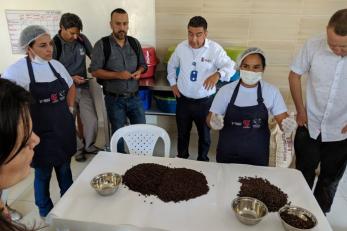
Why Mercy Corps Ventures invested
Based on Mercy Corps’ extensive experience in Colombia, we immediately saw the potential of Vega. Roasting at origin has been attempted before — there is a graveyard reserved for co-ops, NGO programmes and businesses that attempted to forge direct market access for farmers on more equitable terms. What attracted me to Vega was their track record in working in deep collaboration and humility with Nicaragua farmers. They listened, adjusted, and built a strong operation from the ground up. Most importantly, they had the grit, hustle and tenacity to create a demand for the coffee with a growing set of monthly subscribers and, increasingly, corporate customers. The founding team was strong having all been on the ground in Nicaragua for years, having unique expertise (one of the founder is a certified Q-grader), and having a strong understanding of their needs and pain points. Vega has demonstrated an ability to “jump the line” of people wanting to purchase beans from farmers because of strong relationships and commitment to farmer friendly contracts. We also thought the Mercy Corps could bring a lot of value to Vega with our network of coffee farmers across the world (80,000 alone in Colombia) and deep market knowledge. Bringing non-financial value is a core component of how we evaluate investments and if we can’t be value-add we try to point entrepreneurs to someone that can.
Why peer entrepreneurs invested
If you’ve read this far, then you’re interested in impact investing and have likely heard of Village Capital, an impact investing organisation that has a model that’s different than most. Village Capital chooses which companies to invest in through a unique process called “peer-selected investment” — they put the power of investment in the hands of entrepreneurs themselves. In 2018 Village Capital ran an agriculture accelerator programme, which brought together startups working across the value chain to improve the sustainability of the global food system. Over a three-month period, the entrepreneurs got to know each other, met mentors and investors, and then ranked each other on eight “investment-readiness” criteria. Vega was one of the two highest-ranked ventures from the final ranking and received an offer of investment from VilCap Investments. Vega scored the highest in team, business model, and potential for exit. Their peers were confident the team would deliver results, make the right hires, and the tenacity and drive needed to succeed. They thought the company’s business model was viable and resilient enough to navigate value chain and market risks. And they thought Vega was operating in a market that is seeing acquisitions and other types of exits and could deliver a return for investors.
Catalysing the fourth wave
We are excited to join Vega on its journey to establish roasteries in every coffee growing region of the world and transform the coffee industry.
It was a personal privilege last week to sit down for a coffee with Vega’s farmer roasters in Cauca, Colombia, as the team walked me through the bean selection, roasting and packaging process. Mercy Corps Colombia and its partner Caficauca helped Vega Coffee expand to Colombia in mid-2018 to extend its supply chain to farmers like Yessenia Cherrez.
“It’s been quite a beautiful experience. Namely because the caficultor (coffee producer) is so wrapped up in the cultivation piece, he or she ends up completely blind to all that happens further down the chain. Usually they focus on getting coffee to the local collection point, and that’s it… The fact that I am involved in the cupping, focus on quality, and process of bringing a genuinely good product to market brings me great satisfaction… It’s motivating that there are companies like Vega that want to support this work of integrating producers into more parts of the value chain.”
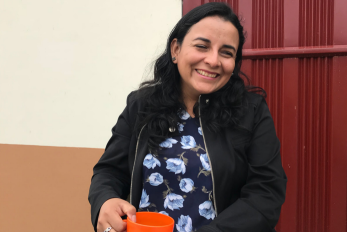
Globally, Mercy Corps has worked with 100,000+ smallholder coffee farmers, and we see tremendous potential to facilitate Vega’s expansion across our network.
We believe that consumers deserve and are increasingly demanding top handcrafted coffee that affords farmers the ability to not just survive, but to thrive. Moreover, we believe that businesses that are work as partners on the ground with and drive more value to their farmers will ultimately be more resilient and successful long-term.


